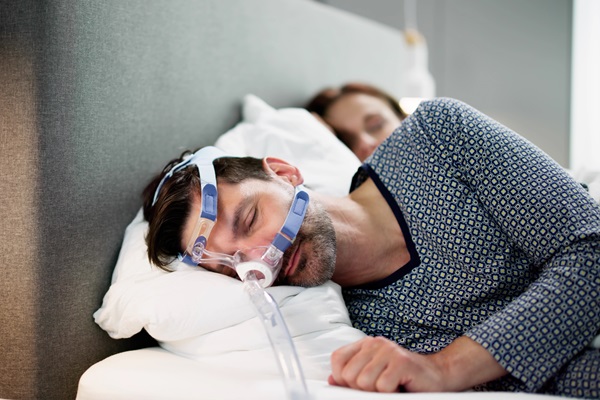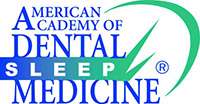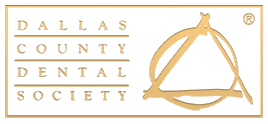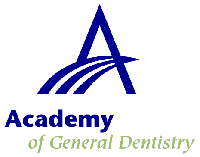CPAP Machines or Oral Appliance? Treating Sleep Apnea
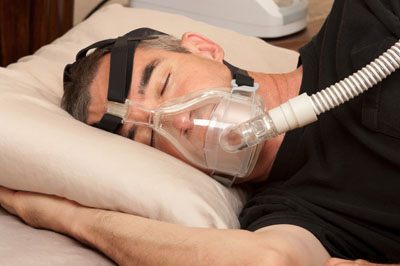
Continuous positive airway pressure therapy is the most commonly recommended treatment for sleep apnea. However, while extremely effective, the CPAP does not work for everyone. When a patient does not take well to the CPAP, a dentist who specializes in sleep therapy may recommend an oral appliance.
Dental appliances for sleep apnea
Oral appliances work best for individuals with mild to moderate cases of OSA, and a dentist may only recommend this treatment after a patient has given the CPAP a solid try. To determine the severity of a patient's case, a sleep specialist — which may or may not be a dentist — will perform a sleep study to determine if an oral appliance is a viable treatment option. If it is, the dentist will recommend one of two types of devices: the mandibular advancement device or a tongue retaining mouthpiece.
Upon first glance, one might assume that a MAD is a mouthguard or orthodontic retainer, as it looks very similar construction-wise to the latter two devices. MADs also work like a mouthguard or retainer, as a patient can fit it into the mouth by snapping the device over the upper and lower dental arches. Metal hinges connect the two pieces. Most MADs can be adjusted by a dentist to provide for maximum effectiveness.
MADs work by thrusting the tongue and lower jaw slightly forward. This position keeps the throat muscles from folding in on themselves during sleep and thereby allow a person to breathe easily at night.
If a patient's jaw cannot be repositioned forward, the dentist may recommend a tongue retaining mouthpiece. This piece is similar in nature to the MAD except that it has a small compartment that sucks the tongue forward, thereby preventing it from collapsing back into the airway.
Oral appliance vs. CPAP
The CPAP machine and oral appliances are vastly different in function and nature. Below are just a few key differences.
CPAP
The CPAP machine utilizes a tube and mask that are worn over the nose and mouth. Air pressure then forces air through the obstruction. This device is large and bulky and comes with several adapters and electrical cords. It typically also comes with a large case, making it difficult for people to travel with it. Many patients report that the mouthpiece is uncomfortable, and because the machine is noisy, it may be difficult at first to fall asleep with it.
Oral appliance
As mentioned above, dental appliances are more like mouthguards. They are small, unencumbering devices with which one can easily travel. Oral appliances do not require electricity, and they are not noisy. Most patients claim they are able to easily adjust to the oral device and fall asleep at night.
Both types of treatment options are typically covered by medical insurance. However, one should always discuss coverage with their dentist before opting for any form of treatment.
Conclusion
Whether or not one should get treated for sleep apnea should never be a question. How one should get treated, however, can be, as there are a few different treatment options. Both the CPAP machine and oral devices are effective and come with their pros and cons. Discuss your options with your dentist during your next appointment.
Request an appointment here: https://stonecanyondental.com or call Stone Canyon Dental at (972) 996-3191 for an appointment in our Sunnyvale office.
Check out what others are saying about our services on Yelp: Read our Yelp reviews.
Recent Posts
Sleep apnea treatments can significantly improve energy, focus, and general well-being. Dentists strive to help patients experience substantial relief and improved sleep through tailored treatment solutions. From comfortable oral appliances to collaborative care plans, these dental providers take a proactive approach to helping you get better rest.Sleep apnea is a common condition that disrupts breathing…
A dental bridge is a restorative treatment that fills the gap left by a missing tooth. These restorations feel similar to natural teeth and prevent additional oral health issues from arising due to gaps in the smile. Qualifying for dental bridges is also easy. Most patients find they qualify, and if they do not, they…
A healthy, complete smile is not only about looking good but is also important for your overall well-being. Dental bridges can help restore the appearance and function of your teeth. However, common misconceptions about these replacement options can prevent people from understanding their benefits. Let us debunk some common myths about dental bridges.While dental bridges…
When a dental emergency hits, it is important to know where to go to access the right care. An emergency dentist is often the right provider, although life-threatening emergencies require a trip to the emergency room. Learning when to go to the emergency dentist versus the emergency room can save you time, money, and discomfort.…

